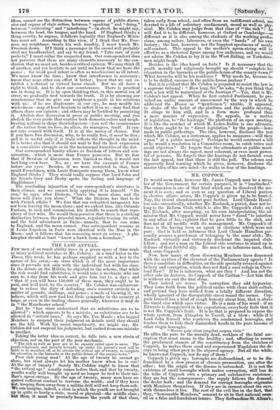THE LAST APPEAL.
FEW men of so much ability have in a given space of time made so many political mistakes as Mr. Cobden : in a brief letter to the Bores, this week, he has perhaps supplied us with a key to the nature of his error,—an error which is of the more importance since it prevails not only with the individual but with his class. In the debate on the Militia, he objected to the scheme, that while the rich would find substitutes, it would take a mechanic who can earn 4s. a day from his work and give him but ls. a day ; and " that if you will have 150,000 of these men, they ought to be paid, and well paid, by the country." Mr. Cobden was endeavour- mg to reduce the duty of defending one's country entirely to a ratter of pounds, shillings, and pence ; a mode of viewing it, we believe, which will now find but little sympathy in the country at large, or even in the trading classes generally, whatever it may do in " the Manchester school."
But he "has since understood that no substitutes are to be allowed ": which appears to be a mistake, as substitutes are to be allowed in " certain cases." So says Mr. Fox Manle ; who begged Members to suspend their judgment on details until they should eee the bill. With his usual impetuosity, we might say, Mr. Cobden did not suspend his judgment, but rushed from one mistake to another.
Taking the latter idea as correct, he falls into a new strain of objection, not on the part of the poor mechanic.
" The rich as well as poor are to be equally called upon to serve. The youth religiously and morally brought up under his parent's roof will be liable to be marched off, as he attains the critical age of twenty, to complete his education in the barracks or the public-house of the county-town."
Poor rich young man ! At the age of twenty he cannot go alone, but must always let his mother know when he is out! At the age of twenty ! Surely Mr. Cobden ought to know that
the critical age" usually comes before that, and that by twenty, youths really well brought up need no longer be tied to their mo- ther's apron-strings. By the age of twenty, many men have ac- quired sufficient conduct to traverse the world; and if they have not, keeping them away from a militia-drill will not keep them safe. We can imagine, indeed, a class in which the youth are not brought
i
up in quite. so hardy a state, moral or physical—trice middle class ;
i
but then, it must be precisely because the youth of that class, taken early from school, and often from an indifferent school, are devoted to a life of sedentary confinement, moral as well as phy- sisal. Mr. Cobden may judge from that class of "the rich '': he will find it to be different, however, at Oxford or Cambridge—as different as it is also among the students of the working profes- sions, among sailors, labourers, or even the " hands " of his own factory; the last, however, not the happiest specimens of manly self-conduct. This appeal io the mother's apron-string will be effective as a rhetorical figure among few audiences, and we would not advise Mr. Cobden to try it in the West Riding, or Yorkshire- men might laugh.
Besides, is the idea based on facts ? Is it necessary that the youth morally and religiously brought up should complete his education in the barracks or the public-house of the county-town ?" What barracks will be his residence ? Why needs he, because he is to be drilled, carouse in the public-house parlour ?
But it is evident that Mr. Cobden is prepared to resist the law in a supreme tribunal : " How long, Sir," he asks, " do you think that such a law will be maintained at the hustings ?"—Yes, that is Mr. Cobden's last appeal. When he first entered Parliament, he pro- voked an undue amount of amusement by the way in which he addressed the House as "ilgentlemen ; unable, it appeared, to shake off the habit of the platform and the public meeting. It clings to him still, and in a form more profound than a mere manner of expression. He appeals, in a matter of legislation, to "the hustings," the platform of an open meeting. It is like the crotchet of which M. Learn-Rollin is one advocate, that there ought to be "direct legislation" by the people—laws made in public gatherings. The idea, however, discloses the test which Mr. Cobden, as a statesman, applies to measures—will they "pass " ati a public meeting ? Perhaps he would construct a bill as he would a resolution in a Committee-room, to catch votes and avoid objection ? He forgets that the attendants at public meet- ings are not always the sagest, most coherent, or even most power- ful of persons. He forgets that the hustings do not furnish even the last appeal, but that there is still the poll. The solemn and apparently final warning which he gives, however, discloses the master idea of his own mind—he walks in fear of the hustings.


























 Previous page
Previous page